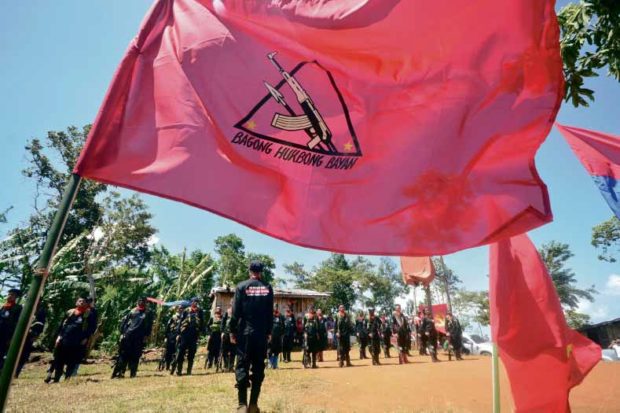Clashes show NPA rejects localized talks

TROOP LINEUP New People’s Army guerrillas stand in formation during a ceremony at a rebel camp in North Cotabato for the release of a captive policeman to Christopher “Bong” Go, President Duterte’s most trusted aide, on July 26.—ARJOY CENIZA
SAN PEDRO CITY — Clashes between government soldiers and communist rebels continued in the provinces of Batangas and Quezon amid a shift in counterinsurgency tactics by the Duterte administration to luring New People’s Army (NPA) units to what officials called “localized peace talks.”
Soldiers combed parts of Batangas and Quezon to hunt down NPA members operating in Southern Luzon and believed to be involved in a series of clashes with government troops.
In San Juan, Batangas, the Philippine Army and local police on Tuesday set up checkpoints on possible escape routes of rebels after soldiers claimed they overran an NPA camp in the village of Bulsa around noon on Monday.
No casualty
The military operation on Monday lasted about an hour and was able to drive out a group of rebels who left behind one Armalite rifle, six backpacks, bullets and homemade bombs, according to the Army.
Article continues after this advertisementThe military said no soldier was wounded during the operation.
Article continues after this advertisement“We are still connecting the dots,” said Lt. Col. Jonathan Manio, head of the Army’s 1st Infantry Battalion, on the possible connection between Monday’s clash and another clash between soldiers and rebels on Friday.
On Friday, soldiers clashed with another group of NPA rebels, who were believed to be under a bigger NPA unit operating in Southern Tagalog, in the towns of Padre Burgos and Atimonan in Quezon province.
The military claimed one rebel was killed in Friday’s clash.
New strategy
In a phone interview, Maj. Gen. Rhoderick Parayno, head of the Army’s 2nd Infantry Division, said the clashes with NPA rebels were results of civilian tips.
Prior to the clash in Batangas, soldiers learned of an NPA plan to attack an Army detachment in the village of Bulsa in San Juan which was thwarted.
Amid the clashes, Parayno said the military continued to reach out to rebels to engage them in local peace talks, which was now the strategy adopted by the Duterte administration following a collapse of peace talks with National Democratic Front of the Philippines, which represents all underground rebel groups.
NPA leaders in Southern Tagalog early this month issued statements rejecting local peace talks.
Parayno said that while “there are no definite guidelines” for local peace talks, soldiers under him “want to exhaust every possible channel like priests, local governments, media, even schools” to open avenues for peace talks with local rebel units.
Rebels, he said, have different reasons for remaining in the movement and local peace talks would be a “realistic” way to bring them back to the folds of the law.